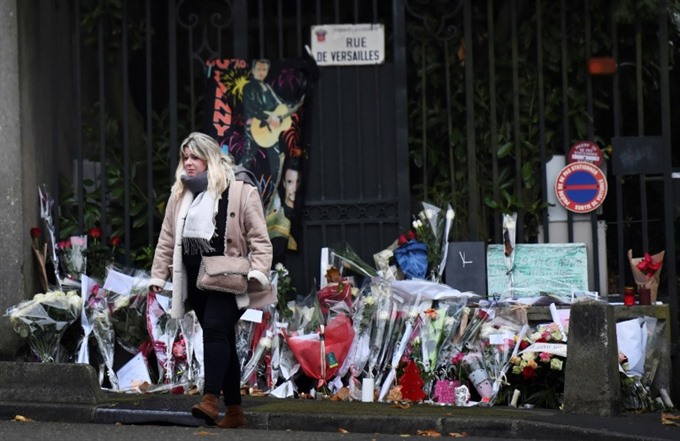 Life & Style
Life & Style

France will pay a "national homage" to the legendary rock star Johnny Hallyday on Saturday, with hundreds of bikers flanking his coffin as it is driven down the Champs Elysees in Paris, officials said Thursday.
 |
| Fans deposed flowers outside the home of French rocker Johnny Hallyday in Marnes-la-Coquette, outside Paris, on Thursday. — AFP Photo |
PARIS — France will pay a "national homage" to the legendary rock star Johnny Hallyday on Saturday, with hundreds of bikers flanking his coffin as it is driven down the Champs Elysees in Paris, officials said Thursday.
Members of his band will play his greatest hits on a stage outside the grandiose Madeleine church where his funeral will be held, while the cortege winds it way through the French capital.
Hallyday, 74, was a lifelong biker who loved to criss-cross America in his leathers on his beloved Harley Davidson, a Gitanes cigarette never far from his lips.
Thousands of his fans are expected to line the route to pay their last respects, with President Emmanuel Macron paying a "brief" tribute to the singer at the church.
The announcement came as speculation mounted that the singer, known as the French Elvis, would be given a state funeral, an honour usually reserved for France’s greatest heroes.
But the French presidency stopped short of that, instead granting Hallyday, who lost his long battle with lung cancer on Wednesday, a new kind of ceremony it dubbed a "popular homage".
Paris transport bosses had earlier renamed a Metro station after Hallyday, whose death has plunged France into mourning.
The RATP transport authority temporarily changed the name of the Duroc station, near the Invalides where Napoleon is buried, to "DuRock Johnny".
The Eiffel Tower will also be lit up over the weekend with the message "Merci Johnny", Paris mayor Anne Hidalgo said.
Adored by young and old, hard-living Hallyday was almost a national monument, selling more than 110 million records despite being almost unknown outside the French-speaking world.
Last goodbye for fans
The cortege will set off at midday from the Arc de Triomphe led by a convoy of bikers from the French Federation of Angry Bikers, which said that it "was only natural that we should pay homage to Johnny, a passionate biker who brought rock ’n’ roll to France."
"Johnny Hallyday’s musicians will accompany him musically" on his final journey, the French presidency said earlier.
Hallyday is likely to be buried in Saint Barts, the French Caribbean island where he had a home, its leader Bruno Magras said on Thursday.
The singer "told me several times he wanted to be buried in Saint Barts. Discussions are going on with the family," he said.
Hallyday’s family has yet to comment.
His villa there was badly damaged by Hurricane Irma in September, but that did not stop the singer from offering to throw open its doors for islanders left homeless by the storm.
French television channels cleared their schedules to broadcast tribute shows to Hallyday after Macron confirmed the star’s passing on Wednesday, declaring that "there is something of Johnny in all of us".
Hallyday first came to fame in the late 1950s yet remained a colossus in French popular culture by adapting to ever-changing musical tastes.
Benign pirate
Former president Nicolas Sarkozy, an adoring fan who once tried to tempt him back from tax exile in Switzerland, said he represented "part of our personal history... our memories and emotions".
Sarkozy conducted Hallyday’s marriage to his fifth wife Laeticia, 42. His predecessor, Jacques Chirac, made him a knight of the Legion d’Honneur in 1998.
Yet the French establishment had not always been so warm to the flamboyant performer who, as he grew older, cultivated an air of a benign leather-clad pirate.
When he started belting out American rock more than five decades ago, Hallyday was seen as a threat to a conservative France led by the stiff General Charles de Gaulle, with one radio announcer even smashing one of his records on air.
But he drove his young fans wild, attracting 100,000 to a Paris square in 1963 and prompting scenes of hysteria wherever he went.
Over the years he kept his bad-boy image alive with a colourful private life, ticking off many rock ’n’ roll rites of passage, and was rarely off the front pages of celebrity magazines.
He was still filling stadiums as late as this summer, when he teamed up with other veteran French rockers for the "Old Scoundrels" tour. — AFP




